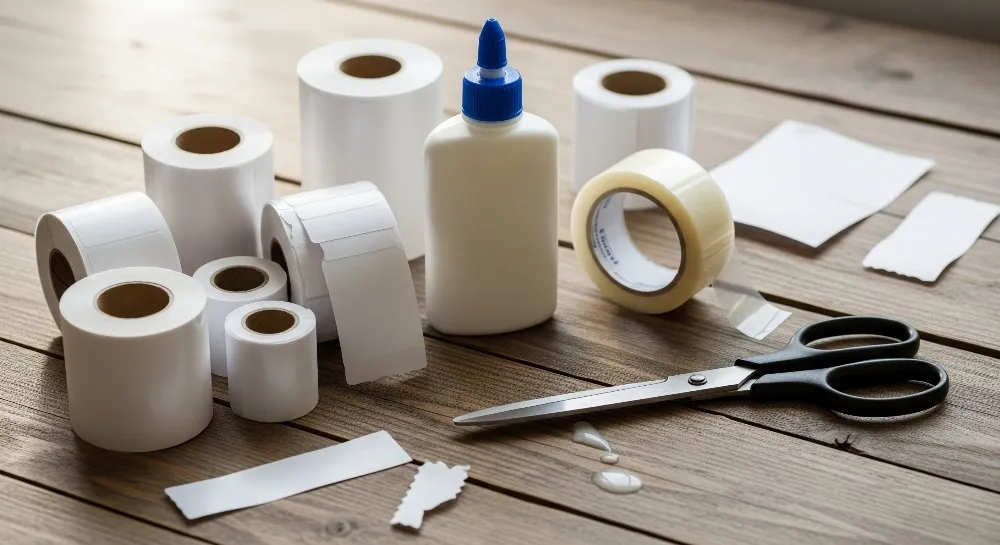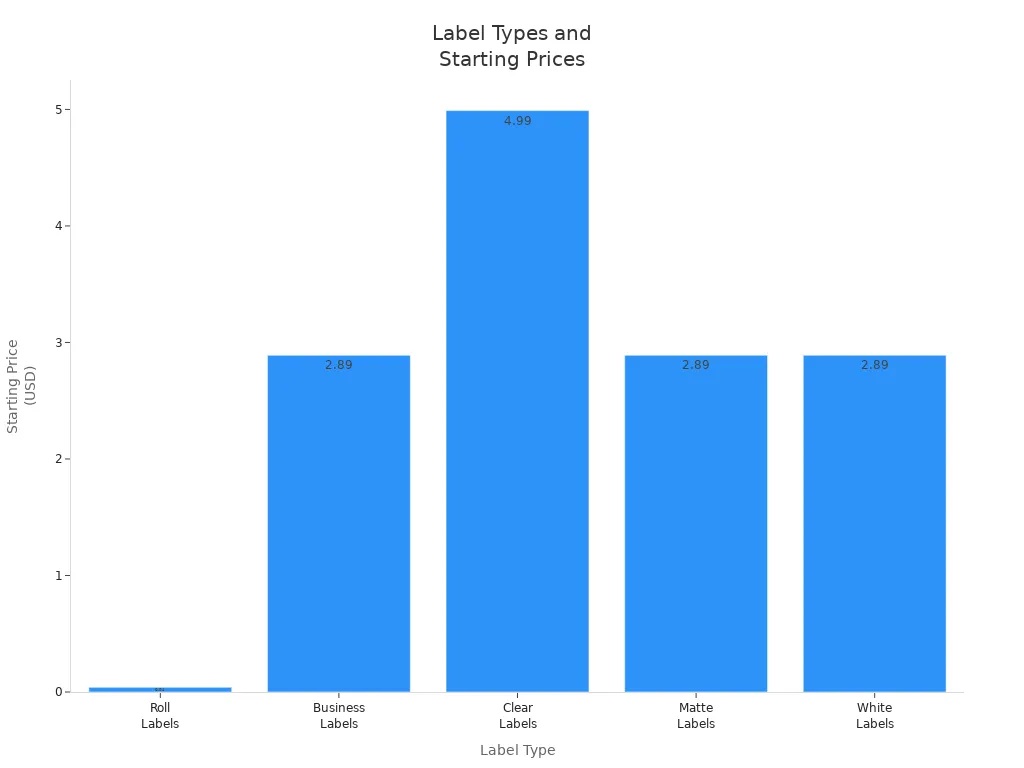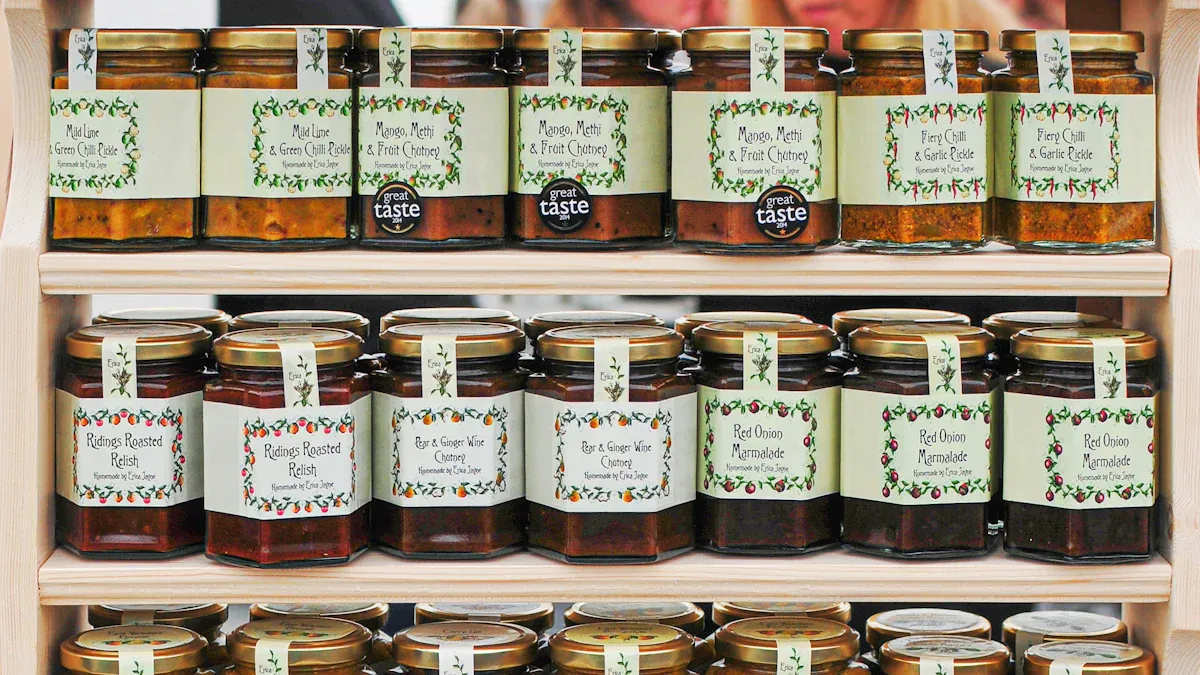
People look for ways to make cheap labels. They do not want to spend a lot. They use normal printers and packing tape. They also use things found at home. This helps them make labels that do not cost much. Many people pick free design tools. These tools help them change how their labels look. These diy ways help save money. They also make labels look good. New learners and small business owners find it simple. They can make cheap labels at home.
Making cheap labels is flexible. It lets anyone make labels for any need.
Key Takeaways
You can use things like blank label sheets, packing tape, and printable vinyl to make cheap and strong labels at home. Free design tools like Canva help you make labels that look nice without spending more money. If you use packing tape to make labels, it keeps water out and helps the labels stay on jars, bottles, and packages for a long time. Buying a lot of labels at once saves money for small businesses and helps them keep their brand looking the same. Put labels on clean and dry surfaces to make them look better and last longer.
Materials for Cheap Labels

Paper and Label Sheets
Many people use blank label sheets at home. Uncoated white paper sheets with sticky backs are cheap. These sheets work for most DIY label projects. For example, 48HourPrint.com sells small sheets for about $8.58 each. Bigger sheets cost $2.80 each. Matte photo paper and glossy sticker paper are good choices too. Matte sheets are easy to write on, so they fit food or cosmetic labels. Glossy sheets look shiny and work well for product labels. Thermal labels from thermalabels.com are great for cheap shipping and product labels. People print custom designs on blank label sheets. Printable vinyl sheets resist water, so they are best for labels that get wet.
Adhesives and Tape
Packing tape is a common way to make waterproof labels. You print a design on regular paper. Then you cover it with clear tape. Next, you soak it in water and peel off the paper. This leaves a strong label that sticks to glass, wood, or plastic. Heavy-duty packing tape works best for this. Spray adhesives help stick labels to things. Permanent adhesives last longer and resist water and heat. Removable adhesives come off easily but do not last long. The chart below shows starting prices for label types:

Household Alternatives
You can use things at home to make labels. Painter’s tape, Post-its, and chalkboard stickers work for short-term labels. Milk can glue paper labels. Chalkboard paint makes jars reusable for labels. Using old sheets and natural glue helps the environment. Many people buy cheap supplies from Amazon, Walmart, or eBay. PrintPlace and StickerYou give discounts for blank sheets and custom labels. These choices help people learn to print labels at home and save money.
Make Cheap Labels at Home
DIY Labels with Packing Tape
Many people use packing tape for diy labels. This way is easy and does not cost much. Packing tape labels stick well to glass, plastic, and wood. These labels look clear and last longer than some store labels. You need printer paper and strong packing tape. Here are the steps to make cheap labels with packing tape:
Print your label on regular paper. Make sure it fits the tape.
Put the sticky side of tape over the printed label. Press it down flat.
Cut out the taped label with scissors.
Rub the tape hard with a spoon or craft stick. This helps the ink stick.
Soak the taped label in water for five minutes or more. If you soak it longer, peeling is easier.
Peel off the paper slowly. The label image stays on the tape.
Let the label dry until it feels sticky again.
Stick the label on your item.
Tip: Use strong packing tape for best results. Rub the tape well to move the ink. If your label is big, cut it into small pieces and tape each one.
Packing tape labels stick well and look nice. They last longer than many store labels. You can change them for your brand. Here is a table that shows how packing tape labels compare to shipping tape:
Feature | Packing Tape Labels | Shipping Tape Labels |
|---|---|---|
Thickness | Thicker, stronger, long-term use | Lightweight, short-term use |
Durability | High, withstands rough handling | Adequate for shipping |
Appearance | Customizable, professional | Usually clear, less durable |
Adhesion Strength | Strong, good for heavy items | Reliable, but less strong |
Use Case | Branding, storage, diy product labels | Sealing boxes for shipping |
Packing tape labels work well for jars and bottles. They are cheap and waterproof.
Printable Product Labels
Printable product labels help people make labels that look good. You can use label sheets or regular paper. Free design tools like Canva help you make labels easily. Here are some tips for printing diy labels at home:
Pick the right label size for your item and printer.
Use free tools like Canva to design your label. Choose bold fonts and clear pictures.
Add all important details. Check rules if you sell food, cosmetics, or alcohol.
Print a test label to check colors and fit.
Change your design if needed, then print the final labels.
Put the labels on your items neatly.
Use colors, fonts, and logos that match your brand.
Check every label for mistakes.
Pick the best paper for your labels. Matte paper is easy to write on. Glossy or vinyl sheets do not get wet.
Use the right printer settings for your paper.
Note: Printers like Epson EcoTank and HP LaserJet Pro M255dw save money when printing labels at home. These printers work well for cheap product and shipping labels.
Printable labels can be changed for any need. They work for diy product labels, cheap shipping labels, and more. Many people use label sheets for easy printing and sticking. This way helps anyone learn to print labels at home.
Handwritten DIY Labels
Handwritten diy labels are quick and cheap. This way works best for short or personal use. You can use markers, gel pens, or paint pens to write clearly. Handwritten labels are good for jars, bins, or notes.
Feature | Advantages of Handwritten DIY Labels | Disadvantages of Handwritten DIY Labels |
|---|---|---|
Simplicity | Easy, no special tools needed | Not durable, can tear or get wet |
Speed | Very quick to make | Ink may smudge, not waterproof |
Cost | Very low cost | May look less professional |
Accessibility | Materials always available | Best for short-term use |
Printed labels last longer and look better. They do not smudge or fade as fast as handwritten labels. Handwritten labels may fade, so they are best for short use.
Tip: Use waterproof markers for labels on jars or bottles. Write on matte paper or chalkboard stickers for best results.
People should not pick the cheapest materials without checking quality. Bad labels can tear or fade and hurt your brand. Always balance cost and quality so your labels stay clear and last long.
Design and Print Tips
Free Design Tools
Many people use free label design software at home. Canva is a popular choice because it has many templates. It uses drag-and-drop, so designing is easy. You can use Canva online and start fast. Maestro Label Designer has templates for different sizes. It can make barcodes, which helps small businesses. Microsoft Word has label templates and prints easily. GIMP is free and lets you edit images and make cool designs. Visme gives professional templates and lets you change branding.
Tool Name | Accessibility | Key Features | Target Users |
|---|---|---|---|
Canva | Free, web-based | Templates, drag-and-drop, AI image generation | Beginners, small businesses |
Maestro Label Designer | Free, web-based | Barcode, print alignment, nutrition info | Small business owners |
Microsoft Word | Pre-installed on many PCs | Label templates, clipart, shapes | Beginners, occasional users |
GIMP | Free, downloadable | Advanced image editing, custom graphics | Intermediate users |
Visme | Free online label maker | Branding, export as high-res image or PDF | Non-designers, small businesses |
Canva and Visme help people make cheap shipping labels. GIMP has more tools for advanced editing.
Tip: Canva is free and online for diy label printing. Go to Canva to start making labels.
Print Quality on a Budget
Good print quality is important for homemade labels. Printers with 180 dpi work well for diy label printing. The Brother PTD220 costs about $40 and prints labels with little waste. The Epson LW-PX300 costs about $60 and prints on ribbon, tape, and big labels. It gives more choices without spending a lot.
Printer Model | Price Range | Print Quality | Features |
|---|---|---|---|
Brother PTD220 | ~$40 | Good | Low waste, easy label printing |
Epson LW-PX300 | ~$60 | High | Versatile, prints on many surfaces |
Pick “best” or “high quality” in printer settings for better labels. Use cheap ink and good paper like matte or vinyl sheets to save money. Test your labels before printing a lot. This stops waste and keeps colors the same.
Note: The right printer and paper help make cheap waterproof labels and affordable product labels without spending too much.
Applying Labels Neatly
Putting labels on neatly makes products look nice. It also helps labels last longer. Clean and dry the surface before sticking the label. Hold the container still, like in an egg carton, so it does not move. Peel the label from the backing, not the label itself, to stop curling.
Steps for neat label application:
Clean and dry the surface.
Hold the item still so it does not move.
Peel the label slowly and carefully.
Start in the center and smooth outward.
Press firmly to remove air bubbles and wrinkles.
Wait for the adhesive to stick well.
Use a squeegee or roller to press the label down.
Tip: To stop air bubbles and wrinkles, start in the middle and smooth out. This works for cheap shipping labels and diy projects.
Labels that are put on with care look better and last longer. You can find more tips for printing labels at home and picking the best materials by visiting product pages for thermal labels and label printers.
Product Labels for Small Business

Sourcing in Bulk
Small businesses save money when they buy labels in bulk. Buying a lot at once makes each label cheaper. It also lowers extra costs. Some companies sell cheap product labels if you order 500 or more. This helps businesses always have enough labels. It keeps their branding the same. Bulk orders let businesses get better label features for less money. Good suppliers give low prices, free shipping, and let you pick how many labels you want. Bulk buying helps businesses grow and keeps labels ready. It helps them get ready for busy seasons and change fast when needed. Buying in bulk also means less waste and fewer shipments. This is better for the environment.
Feature | ||
|---|---|---|
Product Range | Wholesale custom printed labels and stickers, custom shapes and sizes at no extra cost | Blank and custom printed labels in various materials, sizes, and shapes |
Pricing | Competitive pricing, account-based pricing | Wholesale pricing, bulk discounts |
Shipping | Free standard shipping on orders over $50 | Free shipping on all orders |
Quality | Materials engineered for durability, backed by research and testing | Made in the USA, high quality |
Order Size Flexibility | No minimum order quantities, no setup fees | Handles any order size, specializes in bulk purchases |
Buying labels in bulk helps small businesses grow fast. It also builds strong supplier partnerships.
Custom Packaging
Custom packaging with DIY labels helps small businesses stand out. Owners can make their own labels at home. This lets them design special packaging. It helps customers remember their brand. Using the same look on all labels makes the business easy to recognize. Custom labels share important details and look professional. Digital printing lets businesses make sharp label designs for less money. Custom packaging makes products look valuable and builds trust. Small businesses can use label sheets and home printers to save money. Simple designs, easy-to-read fonts, and clear pictures make labels look good. Printing test labels helps check quality.
Custom packaging with product labels helps customers remember your business. It also helps your brand grow.
When to Use Online Printing
Small businesses sometimes pick between printing labels at home or using online services. DIY printing works well for small batches. It lets you change labels quickly. Online printing is better when you need lots of labels. It gives better quality and saves money for big orders. Some services offer lower shipping rates and make sending products easier.
Method | Pros | Cons |
|---|---|---|
DIY | Print right away, full control, good for small amounts | Lower quality, fewer choices, takes more time |
Online | High quality, bulk savings, same look every time | Costs more at first, harder to change labels |
Online printing works best for businesses that ship many products. It gives cheap, high-quality product labels.
Making cheap labels at home helps people in many ways.
Private labeling lets small businesses make their own designs. This helps their brand look better.
Printing labels when needed means less waste. It also helps people work faster.
Checking label quality at home makes sure they look good. You can change them easily if needed.
Being flexible means you can make new labels fast. This is good for special sales or new items.
Aspect | DIY Label-Making | Print-on-Demand (POD) |
|---|---|---|
High | Low | |
Time Investment | Significant | Minimal |
Profit Margins | Higher potential | Moderate |
Logistics | Manual | Provider-handled |
People can test different DIY ways to see what works best. These ideas help families and small businesses save money and still get good labels.
FAQ
Can someone make waterproof labels at home?
Yes, you can make waterproof labels at home. Put packing tape over printed paper to make it water-resistant. Printable vinyl sheets also work for cheap waterproof labels. These ways help labels last longer on jars, bottles, or packages.
What is the best paper for homemade labels?
Matte sticker paper is good for writing by hand. Glossy or vinyl sheets do not get wet and look nice. Many people use these papers for cheap product labels and shipping labels. Always test your paper with your printer before making lots of labels.
How can someone print labels at home without special equipment?
A regular inkjet or laser printer can print labels at home. Free label design software like Canva helps you make designs. You can use label sheets or plain paper with packing tape for DIY label printing. This saves money and works well.
Are there free tools for designing labels?
Yes, free label design software like Canva, Maestro Label Designer, and GIMP help you design labels. These tools have templates and are easy to use. Many small businesses use them for cheap shipping labels and product labels.
What is the cheapest way to make product labels for a small business?
Printing labels at home with a regular printer and blank label sheets costs less. DIY label printing lets small businesses change designs fast. Buying supplies in bulk and using free design tools also saves money for shipping and product labels.
